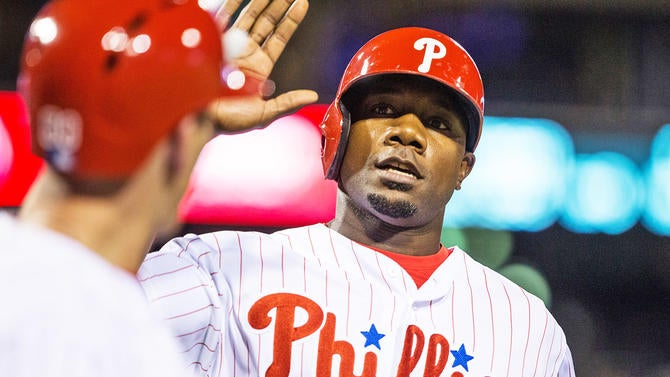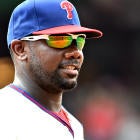Phillies first baseman Ryan Howard is poised to see his playing time reduced during the expanded-roster period of September, and he's not especially pleased about that.
Here's what Howard had to say about Pete Mackanin's decision to give prospect Tommy Joseph some additional reps (via Bob Ford of the Philadelphia Inquirer):
"You're talking about an evaluation process of where you've gotten to see players this year play. And you'll have another opportunity to see those same players play again next year and I won't be here. So, for me, I just want to play. I don't necessarily think it's right or fair, considering this is my last month here, but it is interesting."
Howard's frustration is understandable in at least once sense. He's a highly competitive athlete, and he's been a fixture in the Philly lineup for more than a decade.
It's also not incumbent upon Howard to have a clear-eyed view of his current skill level. That's management's job, and that's in part why this shift is happening. You see, Howard is batting .195/.249/.440 in this, his age-36 season. While he's still capable of running into one on occasion, an OPS+ of 80 is well south of acceptable for a defensively-challenged first baseman. His 2016 struggles also occur in a larger, and unsurprising, pattern of age-related decline for Howard.
That brings us to the matter of his expiring contract. The five-year, $125 million contract extension that Howard signed in April of 2010 and then didn't kick in until the 2012 season is finally coming to an end. The Phillies will pay the $10 million buyout on his $23 million option for 2017, and at that point one of the worst contracts of the modern era will draw to a close.

Howard's had a darn good career: 377 homers, 125 OPS+, strong postseason numbers. He deserves to be remembered fondly by Phillies fans for being a core member of those great teams of the 2007-11 period.
The contract, however, was a boondoggle from the team standpoint. Over the years covered by the extension, Howard put up a 95 OPS+ and a cumulative WAR of minus-4.1. Most Phillies fans gnash their teeth when they ponder the terms of the Howard deal, and that's a justifiable response. However, if you're a fan of the game as a whole, then you should be perfectly fine with the fact that the Phillies were forced to pay this much for a diminishing asset.
In MLB (and the NBA, for instance), long-term contracts are guaranteed, which means teams must pay the full terms of a player contract. NFL teams, on the other hand, guarantee only a negotiable percentage of the contract's overall value, which allows them to back out of the deal in the event that it turns bad for them. The player, though, is obligated to fulfill the terms of the agreement, barring successful holdouts and the like.
In baseball, this is a good thing, and I'm talking about notions of fairness. The Phillies, even though Howard was two years shy of having enough service time for free agency, signed him to an extension that seemed to include no "hometown" discount whatsoever. It was also a contract that would cover the mid-30s of a big-bodied first baseman whose value flowed from his power. In other words, it was a contract that looked bound to turn out poorly for the team, and that was obvious pretty much to anyone except those in the Phillies front office.
The Phillies, then, made a serious mistake in signing Howard to such a huge deal, and no hindsight is necessary to call it a serious mistake. Mistakes should have consequences in the competitive cauldron of sports. For the Phillies, they had to devote a high percentage of their payroll to an impossible-to-trade contract, even as they entered a rebuilding phase.
Good, I say. If a team makes a poor decision on a massive scale, then said poor decision should hamper them moving forward. So it was with the Howard contract.
So long as Howard wasn't derelict in the baseline obligations of his contract -- and he wasn't -- then it's perfectly just that the Phillies should take such a hit. We like to thunder about accountability when it comes to struggling players, but we lose sight of the fact that guaranteed contracts serve to hold teams to account for their personnel decisions. We shouldn't.
When you hand out infamous deals like, say, the ones bestowed upon Jason Schmidt, Mo Vaughn, Carl Pavano, Carl Crawford, Josh Hamilton, Barry Zito, Mike Hampton, Denny Neagle, etc. (add Albert Pujols and Pablo Sandoval to the list soon enough, probably), you should absolutely suffer for it.
So before you hold forth with any bad-contract lamentations, let's remember that those deals provide the teams with sound incentives to do better next time.






















